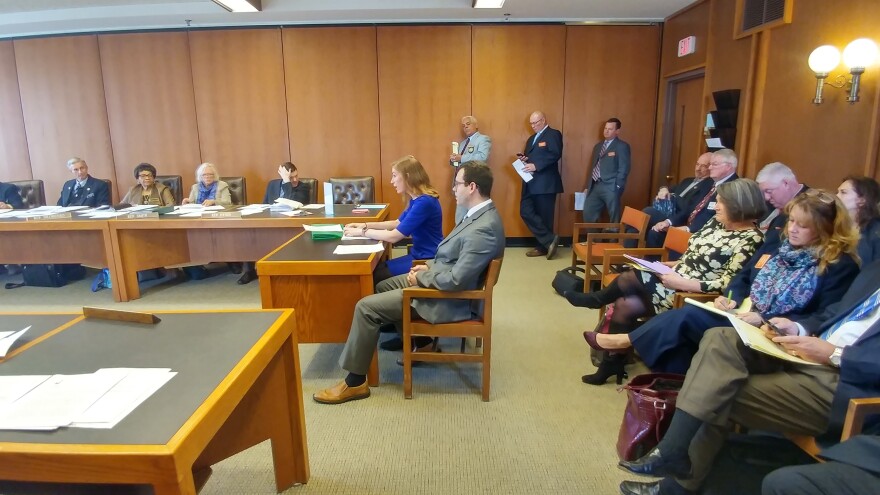State lawmakers are considering a deeper study of asbestos issues in New Hampshire. It would look at how fairly and quickly people who were exposed to the toxic substance can get compensation.
But asbestos lawsuits are all but nonexistent in the Granite State.
Instead, the legislature’s interest in the issue stems from a national campaign – and it has some advocates worried about obstacles for future cases.
Manchester attorney Anthony Carr used to work in Hawaii, representing people who were exposed to asbestos decades ago at Pearl Harbor. When they called him, they’d been diagnosed mesothelioma – an incurable lung cancer only caused by that toxic building material.
“And the clock is ticking, because the plaintiff has at most – if they have the wherewithal to come to us immediately – they have at most 12-18 months to live,” Carr says. “So our job is to figure out how was this person exposed to asbestos during the course of their lifetime.”
Asbestos is less common than it used to be, but it’s not gone – it’s removed from hundreds of buildings a year across the state. And since bits of it can sit in your lungs for decades before they make you sick, mesothelioma death rates are still pretty constant, too.

Now, you might have seen commercials telling mesothelioma patients they can get money from the companies responsible for the asbestos that got them sick, but that’s more complicated than it sounds.
Carr uses the example of a full glass of water to explain why.
“You turn the faucet, and that last drop comes on, and the water overflows,” he says. “Now, if you’re to have to answer the question which drop of water caused that glass of water to overflow, you can’t point to any single molecule. It’s the cumulative total of all of those waters which caused it to overflow.”
The same goes for asbestos and mesothelioma – if you’re diagnosed, do you go after your employer on the job where you were exposed, or the manufacturer of that asbestos?
Some of those companies have gone bankrupt in recent decades. But they left behind billions in trust funds for people who get sick.
On the other hand, those trust fund payouts are small compared to what could come from a court settlement with a company that still exists today.
‘AN INCENTIVE TO DELAY’
This is the crux of a national fight that’s come to New Hampshire.
The bill here was drafted by the American Legislative Exchange Council, or ALEC, a conservative lobbying group. It’s pushed this asbestos bill at the state and federal level all around the country.
New Hampshire is the first New England state to consider the proposal. As first written, the state Senate bill would add steps for people who want to sue an active company over asbestos.
Before the lawsuit proceeds, it says, the plaintiff has to figure out what bankrupt companies might have helped get them sick, and they have to seek those smaller bankruptcy trust fund payouts first.
The company being sued can also start the process over if they think any trust funds got skipped.
“And meanwhile, the defense has absolutely an incentive to delay proceedings as long as they possibly can – making sure the plaintiff can’t actually take the stand,” Carr says. “Because if he takes the stand live and in person, and the jury can see the real-live impacts of disease, well, they might be more inclined to give him a fair judgment.”
The businesses and insurers who face lawsuits over asbestos say they don’t want to delay anyone’s compensation – they just want a fair trial, too.
Nina Caroselli is a lobbyist for RiverStone, a big insurer with offices in Manchester. Her stance goes back to that cup of water – she says it’s on the plaintiff to figure who’s to blame.
“If you’re not getting the full story, then you have the risk – you face the risk and frankly likelihood – that some defendant in the courtroom is going to get apportioned a greater percentage of liability than would be fair and just, quite frankly,” Caroselli says.
Lawyers for asbestos victims say they already do that as best they can, and then they file trust fund claims after their lawsuits are done.
But those lawsuits aren't happening in New Hampshire now, and haven't been for decades. Even asbestos trust fund claims appear to be rare in the Granite State.
Supporters say the idea of the bill is to head off future abuses of the system.
Opponents go a step further – they say the bill could prevent future lawsuits and settlements entirely, by creating too many hoops for people dying of mesothelioma to jump through.
PREEMPTIVE STUDY
This week, the asbestos bill arrived in a House committee with a narrower focus.
It now would have the legislature study asbestos compensation in New Hampshire, rather than changing any laws right away.
Some, like Londonderry Republican Rep. Al Baldasaro, are still opposed.
“I think the system is working right now, the way it is,” Baldasaro said during testimony in the House Judiciary Committee on Tuesday. “You have a choice, and I believe this study is going to look into how we can limit that choice, OK, and I don’t think we should be limiting it.”
In particular, he says he’s worried the bill will lead to obstacles for veterans with mesothelioma. They make up about a third of the affected population, in part because asbestos was once common in shipyards and large machinery.
Others who supported the original bill argue a study committee will help sort out the confusion. Even some opponents of the idea agree -- as long as they get a voice in the process.








